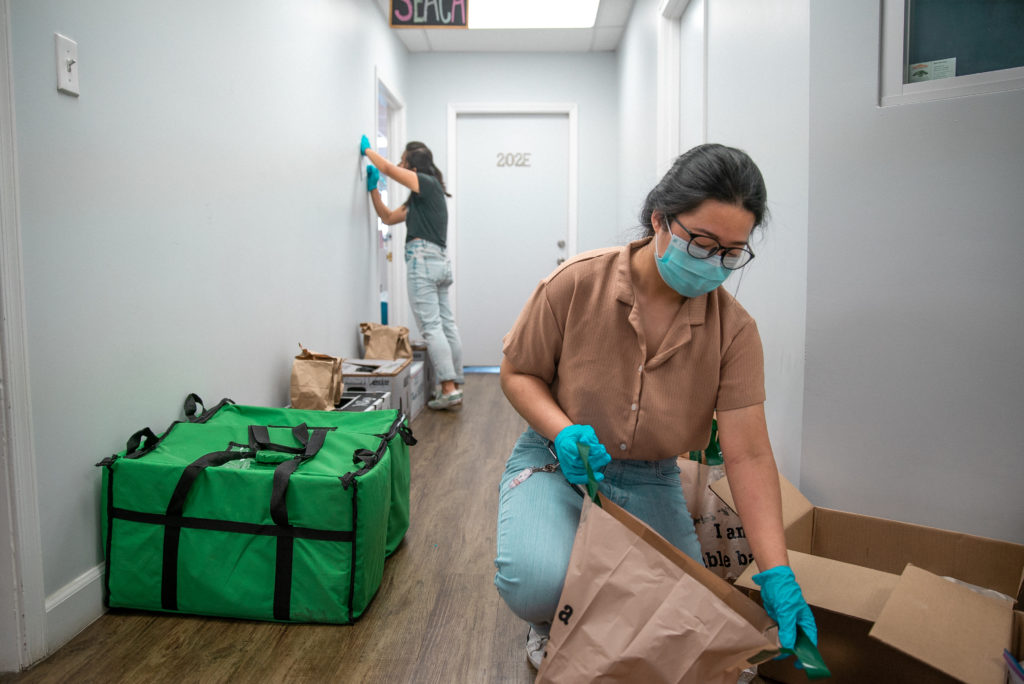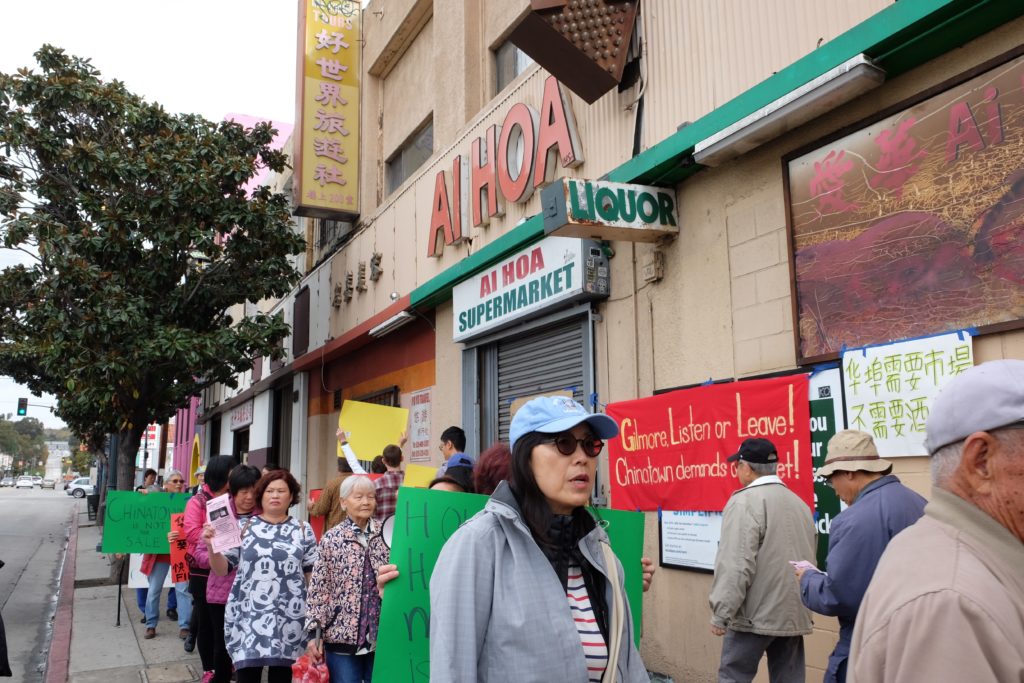
Long before the coronavirus pandemic exacerbated inequalities in Los Angeles, slashing working class jobs and forcing longtime renters out into the streets, Chinatown residents were facing an economic crisis of their own. For more than a year now, tenants from at least seven different apartment buildings in or near Chinatown have been fighting against the threat of eviction and displacement due to rising rents. The downtown Los Angeles neighborhood has become emblematic of the conflict unfolding between low-income renters and luxury real estate developers all throughout the city.
L.A. County leaders extended a moratorium on evictions through the end of September, but serious concerns remain about what will happen to renters when the moratorium expires. And while the city unveiled a rent relief grant program in mid-July, the demand for assistance has exceeded the available funds. For many, staying in Chinatown is more than just a matter of familiarity. It’s the place where residents — many of whom are immigrants — have access to cultural and educational resources and, above all, community.
READ MORE: The Rent Strike That Sparked a Movement
“We’re like a family. We’re united, we get along very well,” Sotheavy Kry says of her fellow Everett Street neighbors. A tenant of the building for over five years, Kry lives there with her father, a recent immigrant from Cambodia. It’s a ten-minute walk from the Evans Community Adult School, where she said her father takes free English lessons. But Kry worries her lifeline to these and other resources could soon vanish: she has been fighting eviction ever since the building was first sold to a new owner last year.
Bryan, a tenant organizer who requested to go by only his first name for fear of retribution from the Everett building’s most recent landlord, says there’s a lack of government protection for residents facing evictions. “What we’re seeing is, you know, just really slow, bureaucratic inefficiency and not a strong enough stance when it comes to something like an eviction moratorium, and then, you know, rent forgiveness or rent cancellation,” he says. “It’s just so slow, and while that is happening, people are extremely stressed out, which leads to adverse health outcomes.”
But tenant activists and organizers aren’t standing by waiting for government aid that may never come. In March, two community organizations, Chinatown Community for Equitable Development (CCED) and Southeast Asian Community Alliance, partnered to collect funds that would support mutual aid resources — food, care packages, and financial support — for Chinatown residents.
Funding sources include individual Paypal contributions as well as grants and donations from companies and organizations. Since March 26, volunteers have been distributing produce bags and other mutual aid deliveries every other week.
Care packages, which are tailored to meet each household’s specific needs, include items like hand sanitizer, toilet paper, paper towels, bleach, masks, gloves, dry goods, sponges, soap, and tenants’ rights flyers. Organizers work with another community group, the Asian Pacific Islander Forward Movement, to put together the produce bags, which typically include a dozen eggs and locally sourced Asian groceries.
“The reason why we had to start delivering meals, hot meals specifically, is because Mayor Garcetti’s food program was too slow,” says Isabella McShane, a member of CCED, which advocates for good jobs, affordable housing, and quality education resources for Chinatown residents.
“We had our seniors sign up weeks before, and they didn’t get any callbacks from the city for like two weeks. And that’s a pretty long time,” she says, referring to the mayor’s emergency Senior Meals Program, which was implemented at the start of the pandemic to deliver meals to seniors.
Mayor Eric Garcetti’s office did not respond to requests for comment.

The food deliveries are especially crucial since Chinatown lost its largest and last full-service grocery store last year. Ai Hoa Market, which had been a Chinatown staple for more than 30 years, was forced to relocate to South El Monte in November 2019 after its new landlord increased the rent. The closure of Ai Hoa market hit Chinatown residents especially hard since it came just two months after another longtime grocery store, G&G Market, was forced to close due to rising rents.
Ever since, food options have quickly dwindled for Chinatown’s senior population, many of whom usually walk to buy groceries.
“Our residents are going out farther to get their groceries and they’re going all the way to the SGV,” McShane says. As a result of gentrification, many of Chinatown’s Asian American residents have slowly fled to the San Gabriel Valley, where rents are more affordable.
But moving elsewhere — and ostensibly further from the city’s center — is not a reasonable option for many residents who have roots in Chinatown.
Leslie Hernandez, a local tenant who was raised in the neighborhood, is one of them. She understands why luxury developers would be drawn to Chinatown — the neighborhood, after all, is near the center of downtown and rich with public transit routes. But, she says, they fail to see the repercussions for the existing community.
“They don’t care about evicting people from their homes, they don’t care about evicting people who have had businesses here for years,” she says.
“Everyone wanting to go back to normal isn’t what we should be striving for… our normal before was what made our community so vulnerable in the first place.”
Isabella McShane, organizer, CCED
Hernandez is a resident of the 124-unit Hillside Villa apartments, located just up the hill from where Sunset Boulevard in Echo park turns into Cesar E. Chavez Boulevard in Chinatown. Built in the late ‘80s under a city program that offered tax credits to developers who built low-income housing, Hillside Villa offered below-market-rate rentals for three decades. But the affordability covenant it was built under expired in August 2018, leaving many residents — including immigrants from China, Vietnam, and Latin America — to fend for themselves after sudden rent increases.
Some tenants include those who were previously displaced from their then homes to make room for the L.A. Convention Center expansion, Staples Center, and L.A. Live in the late ‘90s and early 2000s.
“There’s a lot of the tenants who came here — there’s maybe like three of them still here — they actually were moved from the Convention Center area 30-something years ago,” says Hernandez. “Eminent domain was used to displace them to build the Convention Center and then expanded, you know, to what is now L.A. Live.”
Now, in a twist of fate, some of these same tenants are asking the city of Los Angeles to use eminent domain to purchase the Hillside Villa apartments — this time not to destroy their housing, but to save it.
READ MORE: What Will Become of Crossroads Hollywood?
Owing to pressure from activists, Los Angeles City Councilmember Gilbert Cedillo, who represents Chinatown, introduced a motion to do just that in January. “The Housing Department is in the process of finalizing the report on the motion and property appraisal to be commissioned once funds are identified,” Conrado TerrazasCross, Cedillo’s communications director, said via email in early June. He says there’s no precedent for this specific use of eminent domain within the city of Los Angeles.
But Cedillo wasn’t always this proactive, according to Hernandez. “He wouldn’t even give us the time of day,” she says. “So we decided to show up to every single event that he had until he paid attention to us.”
That attention began to pay off last summer — or so tenants initially thought. In July 2019, Cedillo publicly announced that he’d reached a deal with the building’s landlord, Tom Botz, to extend affordable rents at Hillside Villa for another decade, writing on his Facebook page that he had “come through for the tenants.”
While the statement may have been a boon for Cedillo’s public image, any rejoicing from tenants turned out to be premature. “Nothing was signed,” Hernandez says. “And that was our mistake, that we trusted Cedillo to negotiate without us being present.”
Last August, the tenants at Hillside Villa received a notice signed by Botz stating, “In twelve months, the rules that keep your rent affordable may no longer apply.”
In a public statement, Cedillo said he was appalled and dismayed that Botz and his attorney, Brandon Dimond, would renege on the agreement.
“If [Botz] does take such action, I will request that the city attorney fully enforce and pursue all legal options available to us,” Cedillo’s statement read. “I am willing to use the full weight and authority of the city and its available resources to secure a just outcome for the tenants of Hillside Villa apartments and the city of Los Angeles.”
When asked how the deal fell through, TerrazasCross blames Botz for reneging on the agreement. On October 3, 2019, Hillside Villa tenants received a letter from Botz clarifying that there is no deal with Cedillo to extend affordable rents.
“You may have been told that there is some sort of 10-year deal keeping your rents affordable. That also is false,” the letter reads. “The truth is that NHP [Botz’ LLC that owns Hillside Villa Apartments] has no deal with the city of Los Angeles or with anyone else to extend the current rents or in any way restrict them in the future. Anyone who tells you that there is such a deal is either completely uninformed or is lying to you.”
Botz declined to comment.
Now, the Hillside Villa tenants, all of whom are low-income, are facing a 200% rent increase when the building goes to market rate pricing in September, according to CCED.
While some tenants are still hopeful that the city will use eminent domain to purchase the building, the pandemic has slowed down their fight. “You know, without this epidemic going on, we would probably know right now what our fate is,” Hernandez says. “But unfortunately, because of this COVID-19, you know, we’re still in limbo. We don’t know what’s going to happen.”
Even still, some organizers have little nostalgia for pre-pandemic times. “Everyone wanting to go back to normal isn’t what we should be striving for,” says McShane. “Our normal before was what made our community so vulnerable in the first place.”
This article appears in Vol. 2, Issue 2 of The LAnd. Click here to pre-order your copy.